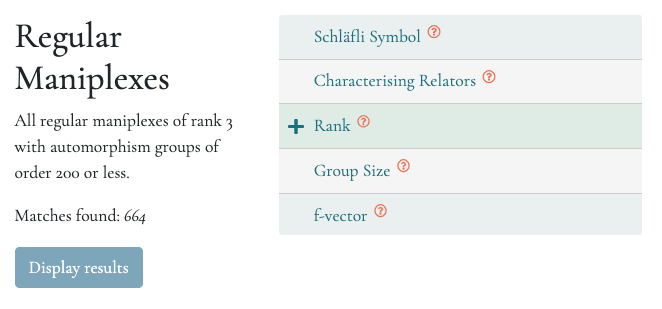Introduction
Mathematicians produce data as part of their research. They do this to find patterns and test conjectures. Because of the complexity of the data, the datasets tend to be hard to share with other researchers. A lot of effort needs to go into developing a suitable infrastructure, particularly so for the larger projects such as the Online Encyclopedia of Integer functions (OEIS), the [L-Functions and Modular Forms Database](https://lmfdb.org (LMFDB), the Small Groups Library, and the House of Graphs, to name just a few. Resources needed to make a mathematical dataset useful to other researchers are typically beyond what a typical researcher has available to them.
Scenario
Gabe works in the area of abstract polytopes and would like to share a small dataset he has produced with his colleagues. He has generated all regular maniplexes of rank 3 with automorphism groups of order 200 or less. In addition to the maniplexes, he has computed a few mathematical properties for each of them. These properties are helpful in understanding the structure of objects. While Gabe is comfortable using a database which he can use to filter and search, his colleagues are not. He wishes there were an easier to use interface he could point them to. In particular, he would like his dataset to be avalable online, so that the users can
- list all the contents, and
- filter maniplexes by their properties.
Suggestion of solution
He submits his dataset to the Data.MathHub platform.
Once his data is imported, he shares the link with his colleagues.
Some instances
Discussion
By publishing his dataset on MathHub Data, Gabe has achieved the following:
- other researchers can easily interact with his dataset,
- his data will stay available in the long-term,
- user interfaces, APIs, and interoperability at the database level and the mathematical level,
- his data will reach a broader audience more easily.
Time and expertise required
Gabe needs to describe the structure of the dataset in JSON format. Similarly, he need to submit his data in JSON.
What’s new since OpenDreamKit started
Before OpenDreamKit, Gabe would have had few options if his data was not in the area covered by one of the larger projects. He could have contacted the authors of DiscreteZOO, but that project had little resources and was not maintained on a regular basis. The other alternative would be to set up a website himself, with whatever resources he had available himself.
Since the end of OpenDreamKit, everyone with basic skills for working with data can use Data.MathHub to share their datasets. Indeed, datasets such as Gabe’s are the focus of the project.

